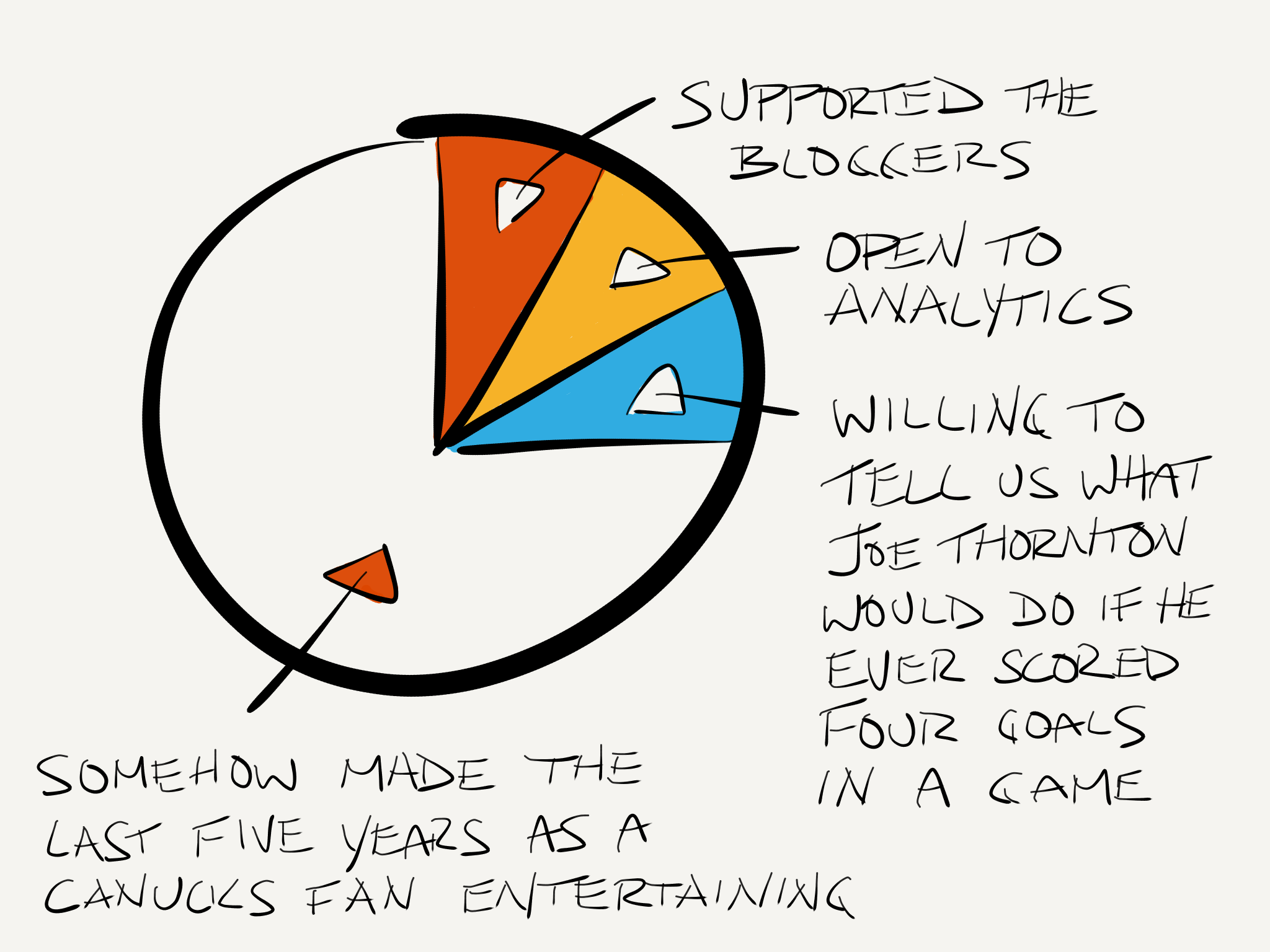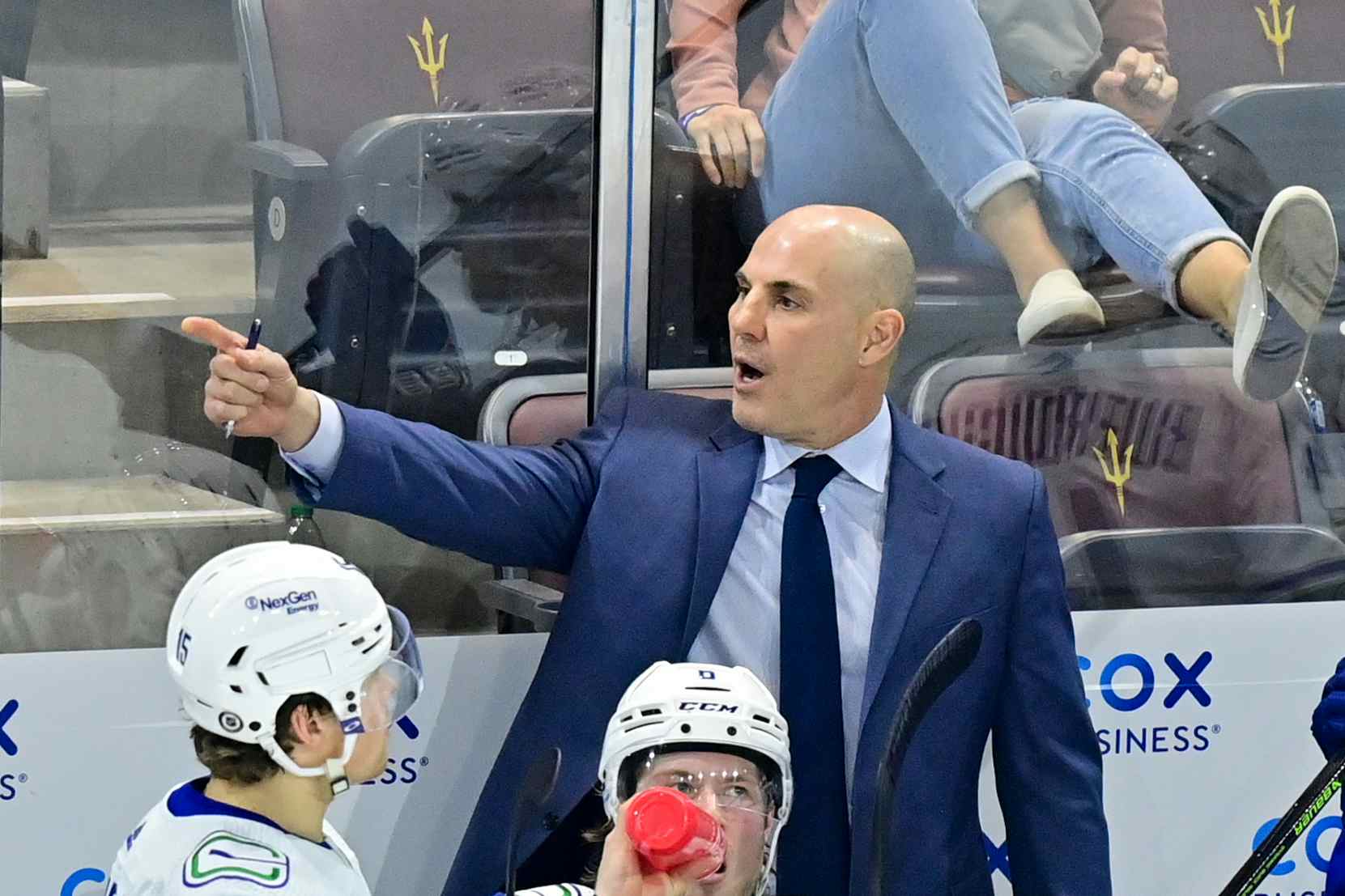BEST CANUCKS MEDIA GUY

I remember walking over to Botchford during the first intermission of the Arizona Coyotes-Vancouver Canucks game in Glendale this spring.
It feels selfish to write something about Botch using the word ‘I’, like somehow shifting the goalposts to center a tragedy around myself instead of the 48-year-old ball of frenetic energy that gave a fanbase entertainment and consolation in the years they needed it most.
But part of what made Jason Botchford such an iconic part of society was the fact that he was, at his very core, an arbiter and relationship-builder within the hockey community.
It was because of that very aspect of his being that I approached him at the game. It was to say hello, sure, and catch up six months after we’d last conversed face-to-face, but it was also to seek advice and support from someone who never got quite enough credit for being that shoulder to lean on.
Botchford was known for having a razor-sharp tongue, a perpetual desire to take things to the precipice and then kick one leg out over the edge with glee. He made it a social media-wide manhunt when someone asked a hilariously foolish question of Canucks rookie Elias Pettersson during a scrum, and sparked a legitimate ethical discussion with his hilariously candid reporting of Joe Thornton’s desire to “have his [rooster] out, stroking it” if he ever scored four goals in a single game. And he wasn’t afraid to quote tweet those he disagreed with to his tens of thousands of followers, responding with fiery and hilarious one-liners that often brought hordes of Canucks fans down on those who had dared disagree with him in the first place.
But it was the way he handled his professional relationships that had me seeking out his advice, and the way he handled his murky, complex relationship with both Canucks fans and the hockey community at large that he should be remembered for the most.
I won’t get into what we discussed that evening in the desert, but the way he responded when I approached him actually took the wind out of me a bit. Wearing that wacky, constellation-studded button-down he favored, he gave me a massive hug and asked me how things were going.
I told him I had a question about whether I was overreacting to something on social media that evening, during the game, that had made me deeply uncomfortable – both as a woman in the industry and as someone who lets her child spend time in the public eye.
“Let’s talk,” he said. “I’m listening.”
‘I’m listening’ is, perhaps, the single most representative phrase in my mind when it comes to Jason Botchford. He listened to Canucks fans as they howled, irate and agonized, about the perpetual wheel-spinning of their favorite franchise. He listened to the bloggers who were coming up beneath him, taking them under his wing as a community rather than treating them like a threat to his own livelihood, treating them like mentees rather than potential career competition. He listened to the team and the coaches and the GM, keeping his finger on the pulse of the Vancouver Canucks heartbeat better than perhaps anyone in that chaotic, confusing market. It takes an iron will and the thickest of skin to survive the Canucks war zone, full of fans as passionate as they are frustrated and as opinionated as they are vocal, and he sorted through the chaos and laid it out in hilarious, often scathing State-Of-The-Union columns that made sense of the league’s most mystifying franchise.
Beyond that, though, he listened when people told him that he could help them, and he – at the very least – was a sounding board to whomever needed him, whenever they came calling.
I’ve written on the Canucks on merely a semi-frequent basis over the last four years, and I’ve ultimately spent more time covering a pair of American-based Western Conference clubs (the Arizona Coyotes and the Chicago Blackhawks) than I ever did Vancouver.
When I expressed frustration with him at a draft years ago, though, that the Canadian markets always seemed to claim they supported growth of the sport without ever amplifying progress, he listened. And when I wrote articles on grassroots programs in Arizona to get girls in the game, covered Ecuadorian hockey teams and affordable initiatives to get children in goalie gear, he started to share those with his own followers with a quiet but reassuring consistency. Botchford was as quick to re-tweet a story about the three Arizona-born women’s hockey stars as he was to go on an eloquent but fiery rant about Loui ‘Littlethinger’ Eriksson, and that’s what made him so remarkably transcendent in an industry full of strong voices.
A lot of people are going to remember Jason Botchford for making them laugh until they cried, and even more of us are going to remember him for giving advice to every single person who sought it over the years. We’re going to remember him for pioneering the ability to be the megaphone a desperate franchise needed, for being the therapeutic salve when Jim Benning got fined for breaking league recruitment regulations or scolded for messing up the entry-level deal for a player being brought over from Europe.
What I’ll remember him for most of all, though, was the fact that he managed to speak so loudly, and so often, while still listening more than just about anyone else I’ve encountered in the last half-decade in this job. He was an empathetic ear and the mouthpiece of a community, and it’s hard to imagine we’ll get to see another journalist like that any time soon.
Thanks for Cat for letting me (petbugs) add a few thoughts to end of her heartfelt tribute:
There are really no words to describe the loss to Vancouver’s hockey community today. At a time when traditional hockey reporting was crumbling all around him, Jason was able to reinvent himself and what it means to be a hockey writer. He took the best of the mainstream media and married it with the irreverence of the blogging community and made something even better.
He did it by embracing, supporting, and nurturing the wider community rather than battling with it. And in doing so, he somehow made following this team entertaining even despite the on-ice results.
I once asked Jason, “what do you do when you’re sick of pointing out the same things over and over again, but they keep doing them so there’s nothing else to write about?”
His reply sums up exactly who he was and how he approached covering this team: “You have to find new ways to say the same things. It’s your job!”
And there was no-one better at that job.
Recent articles from Cat Silverman





